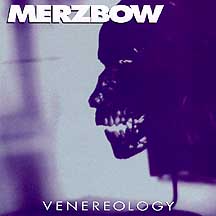Merzbox is a box set compilation by the Japanese noise musician Merzbow. It consists of 50 CDs spanning Merzbow's career from 1979 to 1997. 30 discs are taken from long out of print releases, while 20 are composed mainly of unreleased material. The box also contains two CD-ROMs, six CD-sized round cards, six round stickers, a poster, a black long-sleeve T-shirt, a medallion, and the Merzbook, all packaged together in a "fetish" black rubber box. It is limited to 1000 numbered copies. A Merzbox Sampler was released in 1997.

Oersted is an album by the Japanese noise musician Merzbow. The original pressing came in a bright pink and green Digipak, later repressings were black and white.

1930 is an album by the Japanese noise musician Merzbow.

Venereology is an album by the Japanese noise musician Merzbow. It was inspired by death metal and grindcore.

Aqua Necromancer is an album by the Japanese noise musician Merzbow. It is one of his first releases to use sampled beats. Door Open at 8 am is from the same sessions, but samples jazz instead of progressive rock.

Rainbow Electronics is an album by the Japanese noise musician Merzbow. It consists of a single long track made from 21 hours worth of material. It was the first entry in the Good Alchemy series of harsh noise CDs. An alternate mix called Rainbow Electronics 2 was released in 1996.

Age of 369 is an album by the Japanese noise musician Merzbow. The title is a reference to Onisaburo Deguchi, the founder of Oomoto. Onisaburo claimed to be the Maitreya, which is Miroku in Japanese. 369 is Goroawase wordplay for Miroku. The original track titles are taken from Ultraman monsters.

Cloud Cock OO Grand is an album by the Japanese noise musician Merzbow. It was Merzbow's first CD and showcases his then-new harsh noise style.

Music for Bondage Performance 2 is an album by the Japanese noise musician Merzbow.

Live Destruction at No Fun 2007 is a live album by Japanese noise musician Merzbow, recorded at No Fun Fest in Brooklyn.

Hard Lovin' Man is an album by the Japanese noise musician Merzbow. The album is a deconstruction of the song "Hard Lovin' Man" by Deep Purple from their album Deep Purple in Rock. The first track was recorded live at the Avanto 2000 festival in Helsinki, Finland and was later remixed at Merzbow's home studio. The second track is a studio recording from a month earlier.

Mercurated is an album by the Japanese noise musician Merzbow.

Rainbow Electronics 2 is an album by the Japanese noise musician Merzbow. It is an alternate mix of the 1990 album Rainbow Electronics.

Collection 005 is an album by the Japanese noise musician Merzbow. It is the fifth volume of the Collection series. The first five volumes were recorded for Ylem and consist of studio sessions with Kiyoshi Mizutani, then a member of Merzbow. However, Ylem went out of business before they could be released. Masami Akita then released them himself and recorded five more at home using previous Collection session recordings mixed with new material and effects.

Collection 004 is an album by the Japanese noise musician Merzbow. It is the fourth volume of the Collection series. The first five volumes were recorded for Ylem and consist of studio sessions with Kiyoshi Mizutani, then a member of Merzbow. However, Ylem went out of business before they could be released. Masami Akita then released them himself and recorded five more at home using previous Collection session recordings mixed with new material and effects.

Merzbient is a boxed set album by the Japanese noise musician Merzbow, it is composed of previously unreleased raw material recorded 1987–90.

Yaho-Niwa is an album by the Japanese noise musician Merzbow. The first 50 copies came with a signed and numbered postcard.

Duo, subtitled Masami Akita & Kiyoshi Mizutani Selected Studio Sessions 1987–89, is a box set album by the Japanese noise project Merzbow. It is composed of unreleased studio sessions recorded with Kiyoshi Mizutani. Some of these recordings were used as raw material for solo releases like Scissors for Cutting Merzbow, but the original recordings were unreleased until now. These recordings mirror albums like Ecobondage, Enclosure, and Storage. The art edition comes with a bonus CD with a recording from 1979.

Keio Line is a collaborative studio album by the French electronic rock guitarist Richard Pinhas and the Japanese noise musician Merzbow. The album was released in September 2008, on double CD by Cuneiform Records in the US and on triple LP by Dirter Promotions in the UK. It is the first of several collaborations between Pinhas and Merzbow.




















